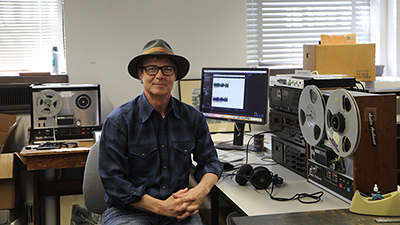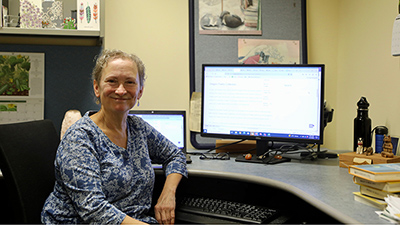Librarians at the University of Oregon are dedicated to providing research support to students and faculty and community members. From aiding undergraduate students on class projects to creating robust online resources, UO librarians contribute to research in exciting, though sometimes less visible ways. This summer term, we’re spotlighting two research endeavors our librarians have been supporting.
Preserving the History of Oregon Through Sound
Digital Archivist Nathan Georgitis has been a part of UO Libraries for almost 20 years and in Special Collections and University Archives (SCUA) for eight of those.
Georgitis explained the importance of his work by first introducing the two reasons why historical sound recordings are at risk of being lost:
- Degradation over time
- Technological obsolescence (e.g., people not having the right equipment to listen to certain media such as cassette tapes)
Georgitis’s work ensures that the UO’s digital collections are preserved and readily available online, so that anyone can access and use them.
The actual process of digitizing audio and visual pieces varies depending on the medium. The audio lab in SCUA has equipment that allows Georgitis to listen, record, and digitize information from analog cassettes and sound disks to open reel tapes and more.
“These formats for recording and storing information were widely adopted in the US because they were readily available commercially,” Georgitis said.

Because of this, and the fact that this equipment was relatively easy to use, the content on these digital assets offers personal insights about individuals and communities. So much history and so many stories are in these tapes. Georgitis’s work helps bring them to light.
After acquiring, processing, digitizing, and granting access to these visual and audio sources, the next step is making these sources permanently available. The assets Georgitis archives are available on a digital collection software platform called Aviary, which allows recorded sound and moving image collections to be stored and made available to the public. Recent additions include the Eugene Lesbian Oral History Project Collection and Cascadia Alive! Television Programs.
When asked why this work inspires him, Georgitis said he takes a lot of pride in making these tapes, videos, and audio clips open for public use because it opens a sort of counterpoint to accepted history.
“I like to think that my work with historical sound recordings centers individuals and communities who are underrepresented in the historical record—whether that’s immigrant communities, Native American communities, or students in Oregon. Working with these materials inspires me because it opens up new areas of research for faculty and students.”
On top of his work for SCUA, Georgitis is also the executive director of the Association for Recorded Sound Collection. This group is made up of 1,000 collectors, researchers, and collection managers all in the historical recorded sounds space. They publish their own academic journals, host annual conferences, conduct webinars and other trainings, and advocate for copyright reform.
Wikidata Brings the Oregon Poetry Collection to Life
The Oregon Poetry Collection, which lives in the UO Libraries’ Special Collections and University Archives, includes books written by Oregon poets or related to Oregon. Monographic Catalog Team Leader Lori Robare has been leading a project to highlight each of these authors in the collection through Wikidata.
Wikidata is similar to Wikipedia in that they both include information that anyone can share and edit. However, Wikidata differs in that it’s very structured data—making it easy for computers to process, which enhances its discoverability. Wikidata is especially useful for correctly identifying individuals on the open Web and connecting them to related works, collections, and organizations.

Robare walked through her process of working on this project. It all starts by looking at a spreadsheet pulled from the library catalog. This sheet includes all the poets' names, identifying information such as birth and death dates, and their book titles in the Oregon Poetry Collection. She uses this information to start looking up the poets, one by one, on Wikidata. Some more well-known poets already have a Wikidata item with full and accurate information and may need little added except their connection to the Oregon Poetry Collection. Most less well-known poets, including those for whom poetry is a sideline, typically don’t yet have a Wikidata item, so she creates a new one. The goal of this project is to include as much information as possible for each poet including, but not limited to, their occupation, city of residence, website, and a statement about their work being in the Oregon Poetry Collection. Currently more than 260 people (about 40% of the poets) are represented in Wikidata with a clear connection to the Oregon Poetry Collection. You can view Information about the collection, including all poets added to date, in an interface called Reasonator.
Robare sees the addition and organization of this information as a wonderful tool for conducting research. She believes that Wikidata can help connect people, works, and organizations in ways that will open new avenues for discovery. For Oregon poets in this collection, it’ll be possible to understand things such as the other occupations they’ve held, where they were educated or employed, journals they’ve edited, awards won, and with whom they’ve collaborated. Wikidata can also facilitate discovery of how scholars and writers have been influenced, including advisors they’ve worked with and dissertations they helped guide. Seeing these connections can help researchers, students, and the general public understand their work in new ways.
Robare thoroughly enjoys that her job helps people easily access information. “I love organizing information, and I love making knowledge and information available to our community.”
—By Kate Lloyd ('23), communications assistant, UO Libraries
